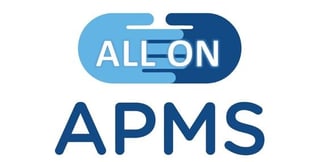All About APMS

 At R.J. Hedges, we firmly believe that working with a Patient Safety Organization (PSO) has numerous benefits. In fact, we enroll our clients with a PSO depending on what services they purchase. I want to share some great information about APMS the PSO that we collaborate with to provide exceptional service to our clients.
At R.J. Hedges, we firmly believe that working with a Patient Safety Organization (PSO) has numerous benefits. In fact, we enroll our clients with a PSO depending on what services they purchase. I want to share some great information about APMS the PSO that we collaborate with to provide exceptional service to our clients.
What is a Patient Safety Organization (PSO)?
PSOs are non-governmental, public or private entities, recognized by the Department of Health and Human Services. In 2005, the Patient Safety and Quality Improvement Act was passed to encourage reporting of adverse events with the goal of improving patient safety. PSOs collect, analyze and aggregate confidential information. This, in turn, assists pharmacies in reducing or eliminating risks and hazards associated with patient care. In the past, the collection of quality assurance data was a double-edged sword. Pharmacies recognized the importance of collecting and studying data; however, the fear of discovery and subsequent damage to legal defense cases impeded reporting. Now, this legislation provides confidentiality and protection when certain requirements are met with a contracted PSO.
Why is it important for pharmacies to have a quality improvement program or work with a PSO?
The importance of a quality assurance program cannot be overstated. The language in most insurance contracts mandates the implementation and use of a verifiable, documented pharmacy Quality Assurance (QA) program. Pharmacy verification and credentialing organizations also require QA programs. Thirteen states already have regulations that require the pharmacy to show proof that they have a functioning QA program in place. Patient Safety Organizations (PSO) offer federal protection to data collected, studied, and reported – so healthcare providers can comply with regulations, work to decrease near misses and errors and keep the work that they do in this area confidential and safe.
What is APMS?
There are currently 80 PSOs in the US. The Alliance for Patient Medication Safety (APMS) is a federally certified, listed Patient Safety Organization. APMS was created by the National Alliance of State Pharmacy Associations (NASPA) in 2005 and is a 501 C 3 supporting organization of NASPA. The mission of APMS is to encourage a culture of safety by providing recommendations on best practices and workflow processes designed to reduce medication errors, improve medication use, and minimize patient risks. APMS has worked with thousands of independent and chain pharmacies across the country to achieve these goals.
Why does R.J. Hedges collaborate with APMS?
APMS offers superior products and services to pharmacies. APMS’s flagship product is Pharmacy Quality Commitment (PQC+), is a program that complies with health insurance and State and Federal requirements. PQC+ provides both regular and compounding pharmacies with the necessary tools to implement and maintain continuous, quality patient care.
PQC+ tools and resources tracks errors and near misses so it is easy to zero in on weak spots with corrective actions or new processes. APMS offers training for pharmacy staff, a secure portal to submit data to the PSO, and the ability to analyze that data with self-generated charts, graphs, and spreadsheets.
The collected data is de-identified, aggregated, and analyzed. Then, APMS generates feedback in the form of tips, recommendations, continuing education, and newsletters posted in the PQC+ Resource Area. Expert recommendations about patient safety and best practices encourage pharmacies to maintain a culture of safety and a cycle of continuous quality improvement.
The quality improvement data and actions that pharmacies use to improve patient safety, is “privileged and confidential” information, thus, the data (errors and near misses) reported to APMS, via a secured portal, is not subject to legal discovery.
So……
Do you want to save labor and time? Do you believe that a PSO can perform a function more thoroughly and efficiently than you can yourself? Do you want the advice, protection and peace of mind that a PSO provides? Then you must ask yourself “Can my facility afford NOT to partner with a PSO?”

